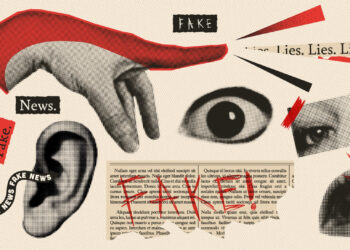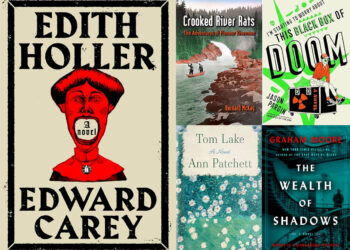
When the Chefs were considering their contributions to this year’s best books posts, an email discussion started. Several of us wondered how do we all find the time to stay informed , with the ever increasing stream of information flowing to us in an ever increasingly complex ecosystem. And, given the increase in professional information, where on earth can someone find the time for pleasure reading?
A little over a year ago we asked the Chefs: How do you stay informed About Scholarly Publishing? But this month we want to focus on time, making it all fit, so we asked the Chefs:
How do you find time to stay informed?
Joe Esposito: I am not informed. I am overwhelmed. Hundreds of emails flow through every day to multiple addresses, created theoretically to help filter the inputs. That’s a joke. There are conferences, email groups, online subscriptions, blogs, white papers–and books! People have the audacity to write books about scholarly communications as though anyone but the author’s mother will find the time to read it, and Mom ain’t looking so great either.
If I had to point to two sources of information (aside from the persistent backdrop of the New York Times), they would be Twitter, where I follow people and publications in the field, and Peter Brantley’s Read 2.0 mailgroup, which is a handy way to keep an eye on new publishing technology. And if I had to refine this even further, I would point to the Twitter feed of Jose Furtado (@jafurtado), which is the most comprehensive set of links about academic publishing anywhere. Jose is my hero, and my savior.
Rick Anderson: I find the time mostly in the cracks between other things. Since I eat two of my meals each day in my office, I generally use that time to read. But throughout the day I also snag odd moments (waiting for a meeting to start, a five-minute break between projects, etc.) to check in on communication streams that are likely to produce threads that I want to grab and pull on — relevant listservs, blogs, news outlets, etc. The moment that I find a thread that I want to pursue is not likely to be a moment in which I can dedicate much time to that thread, so I usually end up marking it in some way so I can come back to it later. And I often print things up so that I can read them easily when I’m traveling. Airplanes are great places for catching up.
David Smith: Well one thing’s for sure; it doesn’t happen during ‘working hours’.
Personally, I find conference/seminar time can be very useful indeed. I think more employees should be able to attend conferences as it’s a very good spend of time for people at all levels. I think the “I wish to learn more so I can do a better job” argument ought to be enough to get sign-off for a good conference. These days I mostly tweet outside of working hours (unless I can carve out the time to remote observe a meeting via the hashtag) so things I retweet or comment on are on the basis of me having read them first. Admittedly, sometimes that’s a skim read.
Basically I am a voracious consumer of words, so the time I have for that, is the time I have for keeping informed. I don’t particularly distinguish between ‘profession’ reading and ‘leisure’ reading. At the moment I’m digging in to Data and Goliath by Bruce Schneier. I’m interested in the subject as is, but it also is helping to inform my thinking around things I believe are important for us in this industry. I don’t have a problem with any of my team requesting books to help them, or the opportunity to spend a bit of time reading them! We run an agile development process, and I’m more than happy for a story to go into the sprint that says “As a [job role] I want to learn more about [insert thing] so that I can understand it better and apply it to the work to be done.” Make it a time-boxed item.
Having just written that… maybe I should take my own advice!
Alison Mudditt: Step one is narrowing the possibilities of what and who to read. Most of my reading list comes from various digital feeds, and I’ve narrowed this to a range of round-ups and more comprehensive, unbiased reporting with a smattering of opinionated sources for context. I’m constantly updating and editing this as I discover new sources and grow tired of old ones.
As for actually reading, I find it important to schedule regular time when I can limit distractions and focus on absorbing what I read. I do this on most days over lunch or during a low energy period of the day. Typically I may only have 15-30 minutes so I’ll focus on skimming various resources, reading short pieces (such as the Scholarly Kitchen) and creating a list of in-depth reading (via Evernote) for when I have more time. Most of my work reading is digital so it’s critical to be able to read across all of my devices easily. Travel time is my best opportunity – whether it’s BART to a meeting or those 15-20 minutes on a flight before I can open my laptop. And there’s nothing like a great publishing podcast to help get me through an hour on the elliptical!
Finally, don’t underestimate the power of learning from others and working together. It’s great to absorb new information, but I learn most when I’m trying to implement this into new projects and building upon it via discussion with our team.
Alice Meadows: A few years ago my answer to this question would have been very straightforward — commuting. I could always count on having a good hour or more each day for reading, whether for pleasure or work. But then came the smartphone — a wonderful invention to be sure, but it means that answering email is possible anytime anywhere and sadly that usually takes priority over reading. And now I work from home — also a great thing but it means there’s not even the option to read on my commute any more. However, as an avid reader from an early age I’m not giving up without a fight!
So my current strategy for finding time to read is two-pronged. First, despite clear evidence to the contrary, I refuse to believe that it’s possible to get internet access on flights! I travel a lot, mostly long-haul, and five plus (mostly) uninterrupted hours in the air is usually enough to read at least one book from cover to cover — bliss… Second, I always, always read in the bath — often (don’t try this at home) on my iPad — and I take long baths! I’m also getting better at having proper digital-free vacations, in part so that I can make time to catch up on my reading. You can’t beat the joy of a pile of good books waiting to be read and a few clear days in which to read them. With the holidays looming, I’m looking forward to making a nice dent in my current pile.
Jill O’Neill: Some of the promising tools I have relied upon in recent years are faced with new challenges in 2016. What takes the place of Twitter, if that struggling communication platform loses the allure it has for my favorite industry colleagues? I am getting my news from outlets like Vox, The New York Times, The Guardian and the various feeds aggregated on Flipboard. (Is that news diet sufficiently balanced? Where else should I be turning? Is this any way to go into an election year?)
Upon reflection, this past year, my best information sources have been my personal and professional connections on various social platforms. The biggest news story of the year broke into my awareness on Facebook after a friend — a former news agency librarian — posted the news that France had closed its borders. (Subsequent postings from her introduced me to several unfamiliar European news outlets.)
Interesting books may initially have come from Amazon as recommendations, but actual purchases were influenced by feedback from knowledgeable buddies on LibraryThing. I returned to Reddit because I’d heard of its resurgence among a younger set of users. But I carefully maintained the balance between the content fueled by a system that knows what I read when I’m logged in and the content viewed when I hit the front page before sign in. Two populations offer two different means for evaluating what is of current interest. Listserv activity may have slowed in this industry, but some lists– like Liblicense or Read2.0 — still serve as an important source of ear-to-the-ground intelligence from the community.
Does this mean that I’ve lost faith in algorithms? Am I bored with branded apps on my tablet? Well, certainly, I hope that 2016 will serve up some shiny new apps out of Silicon Valley to distract and delight me, but human intelligence — the colleague tweeting out a photo of a speaker’s critical Powerpoint slide, keynote speeches streamed over the web, a thirty-minute phone call with an expert, even the casual exchanges between acquaintances crossing paths in an exhibit hall — that kind of intelligence has been what’s carried me through in recent months.
Judy Luther: The emphasis in this question is how we make the time to be knowledgeable about our changing environment. Ironically there is little time in my day that is not spent discovering, reading, or hearing information. It’s possible to be easily exposed to bits of information that keep me up-to-date on news type content. To be knowledgeable, however, involves a more focused effort and it is far more challenging to set aside a block of time to read at length or delve into a topic without distractions or interruptions. Consuming content is only the first part of the process. Being informed takes a village – a diverse one, comprised of colleagues with different experiences and perspectives where discussions support a digestion process. This process of engaging, not just with the content, but our also colleagues, is a continuing part of the process.
The origins of this question arose from the recent exercise when some of the Chefs acknowledged that we don’t have much time to read books. The long form of content is disadvantaged in a fast moving environment when we have to shift gears and focus on a single source for an extended period of time. What some of us are able to work into their days is a luxury for others and requires isolation which doesn’t happen that often.
David Crotty: In July of this year, we asked the Chefs for travel tips, and to my mind, Robert Harington’s advice on achieving a state of “travel zen” rang true — the less I worried about travel mishaps, the more smoothly things seemed to go. That same idea holds true for keeping up with the industry and the world. You can’t read everything, so let it go, stop worrying about missing something, and build a reliable network of colleagues who will point out anything important that may have slipped past your radar. Twitter is a good training tool for this — it’s designed to be ephemeral, you dip into and out of the stream to see what’s going on, and if you obsessively scroll backwards to the last point where you stopped reading yesterday, you’re probably doing it wrong.
That said, I am something of an information sponge, and those 5 to 15 minutes in between meetings or tasks usually get filled with reading the news and opinions of the day. They sit somewhere stewing in the back of my brain and come out a few weeks later, often in reaction to something else I’ve read. As for personal reading, I remember finding some truth in an article from 2013 describing introverts and extroverts. The idea is that the popular perception is wrong — an introvert is not someone necessarily shy or quiet, but rather someone for whom being outgoing is exhausting, rather than enervating. Where the extrovert gains energy from being among others, the introvert needs quiet solo time to recharge. As I fall more on the introvert side of the spectrum, I find I’m happier when I make sure to find that time every day, whether on a commute into New York, on a plane to who-knows-where, or reading for half an hour before falling asleep (though being willing to give up a half an hour of sleep in order to gain that recharge is essential).
Ann Michael: I echo Joe’s sentiment – I’m overwhelmed! As I read through the Chef’s responses it also becomes clear that taking it all in is one thing and understanding with it all means (or could mean) is quite another.
For the former, Rick is spot on with finding the “cracks between other things.” This is one of my key strategies as well. I’m shocked at how much real reading I do on my iPhone in waiting rooms, on lines, waiting for someone I’m meeting, and — ok I’ll say it — in the bathroom (shocked no one mentioned that – let’s be honest folks!). I’m also a huge fan of Alice’s vacation reading strategy. There is joy in a stack of books to go through while sitting by the pool or on the beach. I will also admit that I still read those in print. Nothing like damp pages and bent up paperbacks!!
What I’m not as good at, is what Alison is doing — culling! It seems like a curated list of good sources and a convenient way to aggregate them (Flipboard? Evernote? etc) is core to making the goal of staying informed seem remotely achievable.
For me, as for David S. and Jill (via Twitter), conferences are so important. They also fulfill a need mentioned by both Alison and Judy — learning through doing and through interaction. It is often the networking breaks at conferences, hearing how others are digesting what they’re hearing, that makes the connections and the bigger picture become clear.
While David S. mentioned “it doesn’t happen during working hours,” I feel for Alice in that sometimes when you’re not regularly in an office, that distinction is harder to make. Personally (and this is not something I’m advocating but something that simply is the way it is for me), working and non-working hours as well as professional versus pleasure reading are meaningless distinctions. Where this hurts me is in how I define productive — it’s taken me a long time to accept that I can go on a reading tangent during the “work day” and that’s fine, it is counteracted by work tangents that I embark upon in “off hours.” My point is that part of this process is also giving yourself — taking, if need be — permission. Staying informed as well as pleasure reading is part of being a productive and healthy member of society – just do it!
Now it’s your turn — how do you find the time to stay informed and to read for pleasure? We’d love to hear your tips!
Discussion
16 Thoughts on "Ask The Chefs: How Do You Find Time To Stay Informed?"
I have some bad news for the Chefs: finding time to read everything you want to read doesn’t become all that easier after you retire. Though I’ve been retired since mid-2009 (but still do a little acquiring for two academic presses part-time), I still find it challenging to keep up with reading in all the areas in which I have a strong interest. Getting through the daily newspaper is the top priority for local, state, national, and international news, and I check out the online editions of The Chronicle of Higher Education and InsideHigherEd every day as well. I also remain connected with listservs and blogs like Liblicense, The Scholarly Kitchen, and various AAUP groups. But I gave up my subscription to The Economist in frustration over not being able to keep up, and I am way behind in reading The Atlantic and Texas Monthly to which I subscribe and also the Princeton Alumni Weekly. I try to read articles regularly in Against the Grain, Journal of Scholarly Publishing, and Learned Publishing as well as articles in the journals I get as a member of the American Political Science Association and Latin American Studies Association (relevant to my part-time work) and in Philosophy and Public Affairs (a journal I helped launch at Princeton U.P. back in 1971 and to which i have a free lifetime subscription), but I barely skim the surface, I have to admit. About the only magazines I actually read cover to cover these days are Swimmer (the official magazine of US Masters Swimming) and Swimming World (representing USA Swimming), both because they are relatively short and because I devote more time to the sport in retirement than i did when employed full time. As for books, I find that the best way to keep reading in the field of publishing is to volunteer to review books for places like the Journal of Scholarly Publishing and Learned Publishing.Not only do i get free review copies but I have deadlines to meet that impose some degree of discipline in getting through the books in a reasonably timely fashion. For plane flights I rely on what I have stored on my Nook, where Joe Kracauer’s Missoula currently awaits me.
Trying to figure out how to sign up for the Reading 2.0 mailing list…
Well, my glib comment is that I stay informed by reading posts like this one! 🙂
I also appreciate the distinction several people made between being aware and being knowledgeable. I think that’s a distinction that many of the researchers we support are making more and more: they need to be aware that something exists (e.g., that a recent article says “x causes y in the presence of z”), but they don’t need to study it and critique it, or incorporate it into their own work. This is probably why (in HighWire’s researcher interviews) we saw the shift from “reading a journal” to “scanning the eTOC”: awareness is enough. Similarly, the interest from researchers in annotated TOCs, in “take home messages”, and in visual abstracts supports the right level of awareness, in a very efficient way.
I didn’t see anyone talk about whether they are shifting from a “just in case” knowledge-tracking — where you actually DO try to keep up! — to a “just in time” discovery-based approach: “if I need to know about ‘x’, I’ll do a search for it when I need it.” I have heard that younger researchers are shifting this way, but I haven’t seen the evidence for that (I don’t doubt it; I just haven’t seen a study).
John
This is definitely part of my strategy. I use the Pocket app on my computer and phone to hold things for later. Often I wait to see what kind of twitter buzz it gets before committing to reading/learning about it. Whose talking about it? How long has this been percolating? Do I need to know about it now?
I will say that I get a lot of mileage from knowing a little about a lot of different things. I don’t need to be an expert but you never know what will come up at an editorial board meeting and if I can say, “yes, I was just reading about that…”, it certainly helps. You just have to make sure you don’t go overboard when you only know the bare minimum details.
There are topics that are not in my purview and I leave it that way until I have to know something. I also have a lot of articles in my Pocket that I have never read. But I tag them and can find them later if needed. Lately I’ve been asked to get involved with certain initiatives or speak on certain topics and they are just not topics I know all that much about and I can only “know” so much at that level of detail.
That’s what I do too. And I also use Pocket to do it! 🙂
As many on this list know, there are “deep learning” algorithms that search all materials from journals to grey lit to even blogs, etc. They can not only search through titles, abstracts, texts and often graphical information but also they can extract, summarize and even write cogent articles for various audiences. Many of these are specialized and aimed at professionals; others for the lay public. Many uses these to provide daily scans/summaries while others dig for specialized/select problems much like the innovation sites that pay for crowd sourcing for specific answers.
There are several of these being used by futures or foresight professionals for their own needs or for specific needs of their clients taking “minutes” on a daily basis that normally could take many hours.
Might not the Society and the Chefs provide such a service to its membership?
Thanks, that’s an interesting idea. Perhaps that’s something I can bring up at the next board meeting (one advantage to being someone with significant input to the board agenda for a year!!!)
Reading the comments painfully reminded me of visiting “yesterday land” in one of the many theme parks and watching the creation of hand crafted items using traditional techniques. It also reminds me that the journals with which many here are involved also, almost like an oyster making a pearl, persist in avoiding change in how knowledge is created, transmitted and used, often for purposes different from how the content itself is addressed. I guess the researchers are happy that they don’t send their research, written with pen and quill, via post and production folk are thankful that they don’t use letter presses any more.
Hey David – what’s the record for smiley faces in a comment section? (I would’ve just added one but somehow feel that’s padding the data)
Vert interesting post and discussions – thank you chefs! My contribution would be to look at this from the other perspective: what tools and approaches do you use to tell people about what is happening professionally, what they need to pay attention to? That is, what do you put into the firehose? I’ve just started Tweeting in the last few months (@EdSRLee if you’re asking), and find it a great tool, particularly for the portability (its on my phone rather than the laptop so quicker to get an update ‘fix’).
But I’m now thinking that time I spend retweeting and posting interesting stuff there to my limited number of followers might be better spent on posting to specialist email discussion groups where I know I’ll be reaching the most relevant colleagues.
It would be interesting to have a measure of the criticality of the information that you receive and also the half-life of that information. Then as with any other object, the cost to obtain and the ROI for the investment be it in time or other “treasure”. For example, Wall Street market players will spend much to shorten the length of their computer connections because they trade large sums in fractions of a second. Reminds one of the White Queen in Carroll’s Alice stories. By the way, Princeton has released a nicely done version with the Dali Illustrations (recommend), or you could buy the original Dali illustrated version for an egregious sum through Amazon.
Thanks for this helpful advice, and for the wisdom conveyed through TSK in general. I split my time roughly evenly between a busy surgical practice at the Mayo Clinic and serving as Editor-in-Chief of the “journal of note” in my specialty so the schedule is pretty full. I skim hard copies of the NY Times and the Wall Street Journal (aiming for balance) over breakfast. Spare minutes are few once the day starts but “interstitial time” between patients or surgeries are exploitable and do add up, as others have noted. David Crotty’s comment about the worthy trade of a little more sleep for the chance to recharge from stolen moments of discretionary reading is so true. Belonging to a book group (for > 25 years!) has been a great means of forced discipline to read a wide range of stuff I’d otherwise never knew existed. Thanks again for TSK — a terrific resource.



